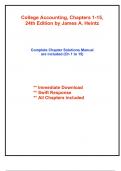Exam (elaborations)
Solutions for College Accounting, Chapters 1-15, 24th Edition by Heintz (All Chapters included)
- Course
- Institution
Complete Solutions Manual for College Accounting, Chapters 1-15, 24th Edition by James A. Heintz, Robert W. Parry ; ISBN13: 9780357989692....(Full Chapters included and organized in reverse order from Chapter 15 to 1)...1. Introduction to Accounting. 2. Analyzing Transactions: The Accounting Equat...
[Show more]



